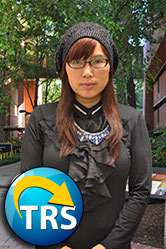Major: Asian Studies
“Conflict of Confucian Ideals and Pragmatic Battle Strategies in Romance of The Three Kingdoms”

 This research will study the Chinese novel Romance of the Three Kingdoms written by a Confucian scholar, Luo Guanzhong in the Ming Dynasty (1368-1644). Among the classic Chinese novels, Romance of the Three Kingdoms is the most popular and has had a profound impact on Chinese literature, society, and culture from the Ming Dynasty until today. Through this historical narrative, the author successfully incorporates his Neo-Confucian ideals, military tactics, and schemes through the many different characters portrayed in his novel. Many Americans are familiar with the main characters such as Cao Cao, Liu Pei, and Zhu-ge Liang through the 2008 Chinese epic war film, Red Cliff, which depicted major battle tactics during the Three Kingdoms Period (AD 220-280). It is well known that Confucian ideals are the foundation of Chinese tradition and ethical values which focus primarily in the cultivation and conduct of proper social relationships. As a Neo-Confucian scholar, Luo Guanzhong purposely depicted Cao Cao as a villain and Liu Pei as the legitimate heir of Han and proper king of Shu, according to the "Mandate of Heaven." Zhuge Liang, on the other hand, is labeled as a "superior man" and all his cunning tactics and military strategies are justified as skillful, sage wisdom and righteousness regardless of their violation of the perspectives of Confucianism. I will use many examples of how the main characters in the novel executed certain military strategies with a purpose to show that the details of these strategies reflect the conflict between Confucian ideals and pragmatic behavior. Finally, by conducting this research, I hope to produce a more scholarly, more in-depth understanding of Luo Guanzhong’s moral ambiguities and conflicting application of Confucianism through his depiction of characters and battle strategies.
This research will study the Chinese novel Romance of the Three Kingdoms written by a Confucian scholar, Luo Guanzhong in the Ming Dynasty (1368-1644). Among the classic Chinese novels, Romance of the Three Kingdoms is the most popular and has had a profound impact on Chinese literature, society, and culture from the Ming Dynasty until today. Through this historical narrative, the author successfully incorporates his Neo-Confucian ideals, military tactics, and schemes through the many different characters portrayed in his novel. Many Americans are familiar with the main characters such as Cao Cao, Liu Pei, and Zhu-ge Liang through the 2008 Chinese epic war film, Red Cliff, which depicted major battle tactics during the Three Kingdoms Period (AD 220-280). It is well known that Confucian ideals are the foundation of Chinese tradition and ethical values which focus primarily in the cultivation and conduct of proper social relationships. As a Neo-Confucian scholar, Luo Guanzhong purposely depicted Cao Cao as a villain and Liu Pei as the legitimate heir of Han and proper king of Shu, according to the "Mandate of Heaven." Zhuge Liang, on the other hand, is labeled as a "superior man" and all his cunning tactics and military strategies are justified as skillful, sage wisdom and righteousness regardless of their violation of the perspectives of Confucianism. I will use many examples of how the main characters in the novel executed certain military strategies with a purpose to show that the details of these strategies reflect the conflict between Confucian ideals and pragmatic behavior. Finally, by conducting this research, I hope to produce a more scholarly, more in-depth understanding of Luo Guanzhong’s moral ambiguities and conflicting application of Confucianism through his depiction of characters and battle strategies.
How did you find your mentor for your research project?
I’m interested in doing research about the Chinese novel "Romance of the Three Kingdoms" and Dr. William Brown is my professor of Chinese literature. He helped me nail down the research topic and gave me advice so that I would have a clear direction and perspective.
How did you know this was the project you wanted to do?
In the course of Classic Chinese Literature, I did a term paper and presentation about the novel and the response was so good that a lot of my classmates wanted to know more about the Confucian ideology and how it implemented through the characters and the pragmatic battle strategies. Furthermore, I wanted to introduce to Americans how “Romance of the Three Kingdoms” is such an important historical novel in China and its profound impact throughout history. As a matter of fact, the pragmatic battle tactics are widely studied and have become so popular that they’re now the main themes of video games and movies.
Is this your first independent research project?
Yes, it is.
Do you get course credit for this work?
Yes. It’s part of my Modern Languages, Linguistics and Intercultural Communications Honors program.
How much time do you put into it?
The whole summer and the fall semester.
How did you hear about the Undergraduate Research Award program?
From the information provided by Dr. Anna Shields.
What academic background did you have before you applied for the URA?
I’m a senior in Asian Studies and Dr. Shields accepted me into the MLLI Honors program based on my academic performance.
Was the application difficult to do?
Not so much. I had the help from my mentor Dr. William Brown.
How much did your mentor help you with the application?
He provided ideas for my research topic and he wrote the recommendation letter for me.
What has been the hardest part about your research?
It is why and how this classic novel can produce such a cultural impact throughout Chinese society.
What was the most unexpected thing?
The research probably leads me to a conclusion that the pragmatic battle tactics in the novel and the Ming Neo-Confucian ideology do not necessarily conflict each other; instead, it is widely accepted and internalized as a way to reunite an empire.
How does your research relate to your work in other classes?
It deepens my understanding of Chinese culture and how the ideology of Neo-Confucianism will never be rooted out even in contemporary society.
What else are you involved in on campus?
Being a volunteer ambassador for UMBC and an active member of the Asian Studies society.
What is your advice to other students about getting involved in research?
Take it very seriously and explore your own interests.
What are your career goals?
Become a certified Chinese Language teacher.
Did you transfer to UMBC from another institution? Where?
Yes. I did. I transferred to UMBC from Anne Arundel Community College.
9/7/2021